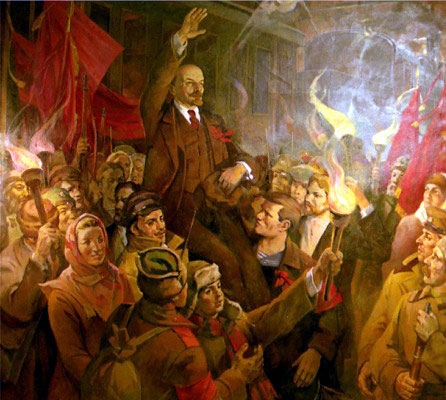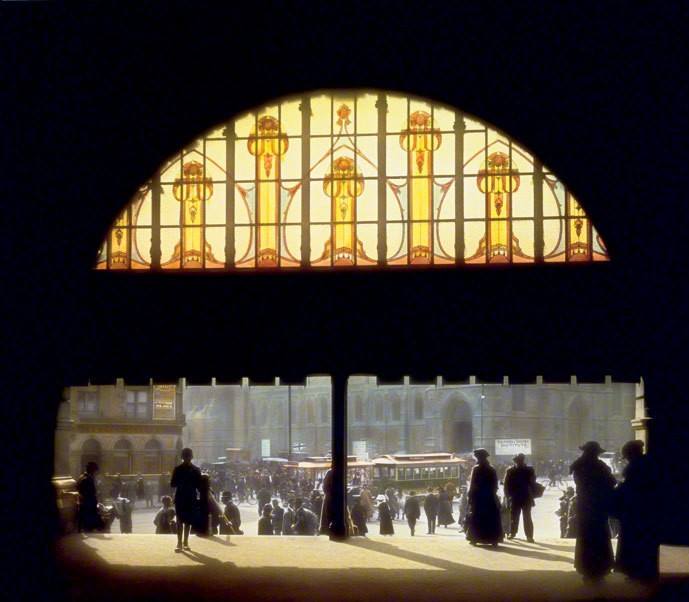‘Divided sunburnt country: Australia 1916-18 (22): The Finland Station and Flinders Street’, Honest History, 16 April 2017
The ‘Divided sunburnt country’ series
Today (16 April) is exactly one hundred years since Lenin arrived at the Finland Station in Petrograd, having come with the help of the Germans from Switzerland across central Europe to the homeland he had been exiled from for ten years. This brief note marks this important anniversary in world history by linking to some relevant resources and by summarising Australian reaction, such as it was, as seen in some of the newspapers of the day.
 Lenin at the Finland Station (20th Century Russia)
Lenin at the Finland Station (20th Century Russia)
In the initial Australian response to the February revolution it is possible to detect some difference between people who worried about the effect of events in Russia on the war effort and, on the other hand, a few socialists who welcomed what they saw as a fundamental change in class relations. Nevertheless, the February (March in the new calendar and in Australia) upheaval was not particularly big news in Australia, compared with the normal run of reporting of the war and domestic politics.
By mid April, Australia was deep in an election campaign. This may have been part of the reason why the latest developments in Petrograd hardly registered here; Lenin at the Finland Station barely rated to the people buying newspapers under the clocks outside Flinders Street station in Melbourne or at other points in Australia’s cities. But then the significance of the Petrograd events was not quickly grasped in other countries either; to much of the world, Lenin in April was just a noisy pacifist with little support.
Lenin’s arrival recalled
The World Socialist Web Site provides a handy guide to what was happening in the world while Lenin trundled across Europe in his sealed train. During that week, 133 workers died in a munitions factory explosion in Pennsylvania (the owner tried to blame German sabotage), the first Battle of Bullecourt claimed 29 000 casualties on both sides for no strategic advantage, and strikes began in Germany. In Zurich, recently vacated by Lenin and his companions, the Dadaists held an exhibition.
Trotsky has a famous account of Lenin at the Finland Station. In the Czar’s Room at the station, awkwardly clutching a bouquet, Lenin gave a speech which was more radical than many of his listeners expected (or some of them wanted):
Dear comrades, soldiers, sailors and workers, I am happy to greet in you the victorious Russian revolution, to greet you as the advance guard of the international proletarian army … The hour is not far when, at the summons of our comrade Karl Liebknecht, the people will turn their weapons against their capitalist exploiters … The Russian revolution achieved by you has opened a new epoch. Long live the world wide socialist revolution!’
In 1954, leading Russia watcher of the day, Edward Crankshaw, summed up what he saw as the situation confronting Lenin in the Czar’s Room that day.
The Russian people had wanted revolution. It had to come. What they meant by revolution was the overthrow of an inept and suffocating tyranny and its substitution by some more liberal system. The Provisional Government, if it had immediately sued for peace with Germany and shown more activity about the redistribution of land, could have remained in power, leading Russia into some kind of democratic system. But because it held to the war, as an obligation; because it knew it would depend in future on the favors of the Entente [Britain, France, the Dominions]; and because it was patriotic, it could not begin to alleviate the misery of the people, greatly aggravated by the war. It was this misery which Lenin deliberately set himself out to exploit.
Then, this year there was an attempt by elderly radical Tariq Ali in the New York Times to get into the mind of Lenin in April 1917.
To move forward, [Lenin] now believed, there had to be a socialist revolution. No other solution was possible. The czarist state had to be destroyed, root and branch. So he said as he stepped off the train in Petrograd: No compromise was possible with a government that continued to prosecute the war or with the parties that supported such a government.
The Bolshevik slogan that embodied his tactical thinking was “peace, land and bread.” As for the revolution, he now argued that the international capitalist chain would break at its weakest link. Winning over the Russian workers and peasants to create a new socialist state would pave the way for an insurrection in Germany and elsewhere.
The Tariq Ali article links to other resources on the Russian Revolution as does the World Socialist Web Site.
 Flinders Street Station, 1917, Burton Holmes (Facebook/NeatOldPhotos)
Flinders Street Station, 1917, Burton Holmes (Facebook/NeatOldPhotos)
Lenin’s arrival as noticed in Australia (part of ‘elsewhere’)
Lenin had written about Australia – to look down on the Australian Labor Party after its defeat in 1913. The party, he famously said, ‘does not even claim to be a Socialist Party. As a matter of fact it is a liberal-bourgeois party, and the so-called Liberals in Australia are really Conservatives.’ Australian newspapers, however, did not have much to say about Lenin in the first month following the events of 16 April. Many Australian papers of 23-24 April picked up the report of the Petrograd correspondent of the London Observer. For example, The Age (Melbourne) of 24 April:
M. Lenin, the leader of the Russian Socialists, who recently returned after having been exiled in Switzerland, has delivered an inflammatory speech, demanding a commune, peace and the abolition of the Government. He has been coldly received by the majority of Russian Socialists.
Other reports noted that some labour groups believed that extremists like Lenin were the best friends of the reactionaries. While some workers demanded an eight-hour day on principle, they were prepared to work 24 hours a day to win the war. The Melbourne Argus headed the same story, ‘Extremists’ wild demands. Workmen bent on victory’. Around this time, the London Daily Express described the Russian Minister of Justice, Kerensky, as ‘the Lloyd George of Russia’, gung-ho for continuing to wage a defensive war.
By 7-8 May, the Australian papers were reporting on riots in Petrograd, quoting the correspondent for the London Daily Chronicle:
A combination of German spies and underhand attempts by the old regime and the pacifist followers of M. Lenin (the Russian Socialist leader who recently returned from exile in Switzerland) has been carrying on during the past few weeks a dangerous agitation in the barracks and workshops. The movement met with some success in the factories, but on Friday practically all the soldiers were for the Government.
Soon, the Australian press was passing on claims, from Sweden and elsewhere that Lenin (or possibly Levin, but real name possibly Goldberg) was a German Jew and even possibly a German spy. By 13 May, however, the London Daily News correspondent in Petrograd was reporting to the Argus that ‘M. Lenin and other extremists were encouraged by the success of their agitation to impugn the authority of the present leaders of the Council of Workers and Soldiers’. It had been an eventful four weeks for the returned exile.
They put [Lenin] in an armored car [writes Crankshaw of that day at the Finland Station a century ago] and drove him in triumph through cheering crowds to the Kshesinskaya Palace, the gorgeous mansion of the prima ballerina who had been the Tsar’s mistress. Krupskaya [Lenin’s wife] was overcome by the tumultuous scene. “Those who have not lived through the revolution cannot imagine its grand and solemn beauty.”
 Another view of the Finland Station (Szinek es Foltok, Hungary)
Another view of the Finland Station (Szinek es Foltok, Hungary)
If there is ever beauty in revolution the newspaper buyers under the clocks in Flinders Street and elsewhere in Australia had no way of appreciating it from the scrappy reports out of Petrograd. The ‘win-the-war’ folk among them might have been a little concerned at the pacifist Lenin’s activities – if they read that far down the war news. In any event, they would hear more of him.


An impressive and enlightening summary of a pivotal event. I especially enjoyed the juxtaposition of the two stations in order to create a central theme point (if you will).